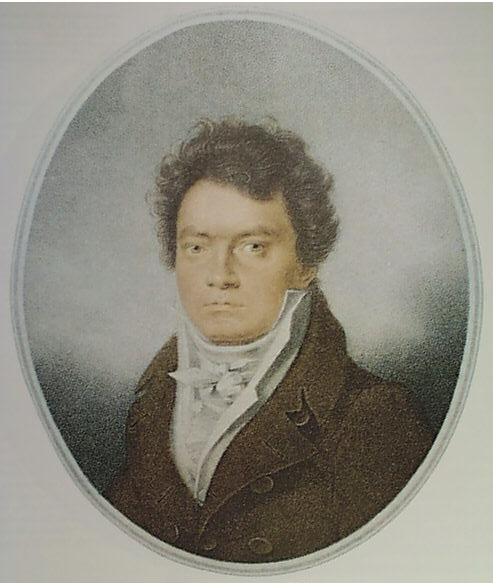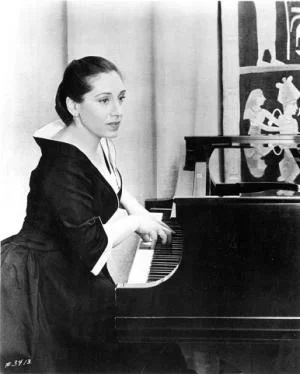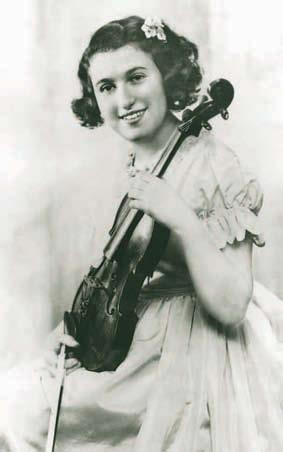This Week in Classical Music: December 12, 2022.Beethoven.Ludwig van Beethoven was born in Bonn on the 16th of December of 1770.We wanted to celebrate Beethoven with performances made by two musicians whose anniversaries we also commemorate this week, the pianist Rosalyn Tureck and the violinist Ida Haendel, but it turned out to be a more difficult task than we expected.We knew that Rosalyn Tureck, who was born in Chicago on December 14th of 1914 into a poor family of Jewish immigrants from Russia, was one of the most important interpreters of the music of Bach.So much so that Glenn Gould said in an interview that Tureck was his only influence.What we didn’t realize is how few recordings of Tureck playing music other than Bach’s there are.If you check out Discogs, that online bible of available recordings, you’ll find none, even though we know that in 1936, when she made her New York orchestral début she played Brahms's Piano Concerto no. 2 with the Philadelphia Orchestra and earlier in her career played many concerts with a broad repertoire.All we could find for this occasion was her Carnegie Hall live recording of Beethoven’s Emperor concerto no. 5.It was radio broadcast on March 17th of 1940.On that occasion, Sir John Barbirolli conducted the New York Philharmonic Orchestra.Here are the second and third movements of the Concerto (we trimmed a very long ovation at the end).
Ida Haendel was more of a surprise.We knew that Tureck specialized in Bach but we thought we’d find many Haendel recordings of Beethoven, considering that his 10 violin sonatas and the concerto are a staple of concert repertoires.That turned out tonot quite be the case.Haendel was 14 years younger than Tureck and also Jewish.She was born in Poland, but her family moved to Britain before WWII. Haendel was a real child prodigy.In 1935, at the age of seven, she participated in the first Henryk Wieniawski Violin Competition in Warsaw.It was a celebrated event, broadly covered by the European (and Soviet) press, and its results were surprising.The 16-year-old Ginette Neveu won the first prize, beating the already famous 29-year-old David Oistrakh, who took second.Another child prodigy, the 12-year-old Boris Goldstein took a rather disappointing fourth prize.But the greatest sensation was probably the performance of Ida, who took the 7th prize, ahead of scores of talented violinists.She went on to have a wonderful career and lived to the ripe age of 91, still performing into her eighties. She made a significant number of recordings, even though many of them were still mono.Among them are just two pieces by Beethoven, his Violin concerto and the Violin sonata no. 8.We know that she performed his other sonatas in concert, why she never recorded them is a mystery.Here’s a recording of Beethoven’s Violin Sonata no. 8 that Ida Haendel made in 1941.At that time she was 12 years old.Noel Mewton-Wood, then 18, is at the piano.(Mewton-Wood, a talented Australian-born British pianist, had a short life: in tragic circumstances he committed suicide at the age of 31.)
Beethoven, Tureck, Haendel 2022
This Week in Classical Music: December 12, 2022. Beethoven. Ludwig van Beethoven was born in Bonn on the 16th of December of 1770. We wanted to celebrate Beethoven with performances made by two musicians whose anniversaries we also commemorate this week, the pianist Rosalyn Tureck and the violinist Ida Haendel, but it turned out to be a more difficult task than we expected. We knew that Rosalyn Tureck, who was born in Chicago on December 14th of 1914 into a poor family of Jewish immigrants from Russia, was one of the most important interpreters of the music of Bach. So much so that Glenn Gould said in an interview that Tureck was his only influence. What we didn’t realize is how few recordings of Tureck playing music other than Bach’s there are. If you check out Discogs, that online bible of available recordings, you’ll find none, even though we know that in 1936, when she made her New York orchestral début she played Brahms's Piano
performances made by two musicians whose anniversaries we also commemorate this week, the pianist Rosalyn Tureck and the violinist Ida Haendel, but it turned out to be a more difficult task than we expected. We knew that Rosalyn Tureck, who was born in Chicago on December 14th of 1914 into a poor family of Jewish immigrants from Russia, was one of the most important interpreters of the music of Bach. So much so that Glenn Gould said in an interview that Tureck was his only influence. What we didn’t realize is how few recordings of Tureck playing music other than Bach’s there are. If you check out Discogs, that online bible of available recordings, you’ll find none, even though we know that in 1936, when she made her New York orchestral début she played Brahms's Piano  Concerto no. 2 with the Philadelphia Orchestra and earlier in her career played many concerts with a broad repertoire. All we could find for this occasion was her Carnegie Hall live recording of Beethoven’s Emperor concerto no. 5. It was radio broadcast on March 17th of 1940. On that occasion, Sir John Barbirolli conducted the New York Philharmonic Orchestra. Here are the second and third movements of the Concerto (we trimmed a very long ovation at the end).
Concerto no. 2 with the Philadelphia Orchestra and earlier in her career played many concerts with a broad repertoire. All we could find for this occasion was her Carnegie Hall live recording of Beethoven’s Emperor concerto no. 5. It was radio broadcast on March 17th of 1940. On that occasion, Sir John Barbirolli conducted the New York Philharmonic Orchestra. Here are the second and third movements of the Concerto (we trimmed a very long ovation at the end).
Ida Haendel was more of a surprise. We knew that Tureck specialized in Bach but we thought we’d find many Haendel recordings of Beethoven, considering that his 10 violin sonatas and the concerto are a staple of concert repertoires. That turned out tonot quite be the case. Haendel was 14 years younger than Tureck and also Jewish. She was born in Poland, but her family moved to Britain before WWII. Haendel was a real child prodigy. In 1935, at the age of seven, she participated in the first Henryk Wieniawski Violin Competition in Warsaw. It was a celebrated event, broadly covered by the European (and Soviet) press, and its results were surprising. The 16-year-old Ginette Neveu won the first prize, beating the already famous 29-year-old David Oistrakh, who took second. Another child prodigy, the 12-year-old Boris Goldstein took a rather disappointing fourth prize. But the greatest sensation was probably the performance of Ida, who took the 7th prize, ahead of scores of talented violinists. She went on to have a wonderful career and lived to the ripe age of 91, still performing into her eighties. She made a significant number of recordings, even though many of them were still mono. Among them are just two pieces by Beethoven, his Violin concerto and the Violin sonata no. 8. We know that she performed his other sonatas in concert, why she never recorded them is a mystery. Here’s a recording of Beethoven’s Violin Sonata no. 8 that Ida Haendel made in 1941. At that time she was 12 years old. Noel Mewton-Wood, then 18, is at the piano. (Mewton-Wood, a talented Australian-born British pianist, had a short life: in tragic circumstances he committed suicide at the age of 31.)
Wieniawski Violin Competition in Warsaw. It was a celebrated event, broadly covered by the European (and Soviet) press, and its results were surprising. The 16-year-old Ginette Neveu won the first prize, beating the already famous 29-year-old David Oistrakh, who took second. Another child prodigy, the 12-year-old Boris Goldstein took a rather disappointing fourth prize. But the greatest sensation was probably the performance of Ida, who took the 7th prize, ahead of scores of talented violinists. She went on to have a wonderful career and lived to the ripe age of 91, still performing into her eighties. She made a significant number of recordings, even though many of them were still mono. Among them are just two pieces by Beethoven, his Violin concerto and the Violin sonata no. 8. We know that she performed his other sonatas in concert, why she never recorded them is a mystery. Here’s a recording of Beethoven’s Violin Sonata no. 8 that Ida Haendel made in 1941. At that time she was 12 years old. Noel Mewton-Wood, then 18, is at the piano. (Mewton-Wood, a talented Australian-born British pianist, had a short life: in tragic circumstances he committed suicide at the age of 31.)